Hilton Hotel: Leadership and Management Analysis and Strategies Report
VerifiedAdded on 2020/11/23
|16
|5428
|61
Report
AI Summary
This report provides a comprehensive analysis of leadership and management within the service industry, using the Hilton Hotel as a case study. The introduction highlights the importance of leadership and management in the service sector, particularly in the context of change resistance. The report then delves into classical management theories, such as Taylor's scientific management and Weber's bureaucratic approach, and their application within Hilton Hotel. It explores the roles of leaders, including representatives of the organization, integrators of goals, and initiators of action, alongside different leadership styles like autocratic, democratic, laissez-faire, and bureaucratic. Furthermore, the report reviews various management styles, including result-based, collaborative, strategic, affiliative, and authoritative approaches. It also examines the internal and external factors, such as political, economic, social, technological, legal, and environmental (PESTLE) factors, that influence management style and structure. The report then discusses current and future management and leadership skills, along with change management systems and leadership in implementing change within the service industry. The report concludes with a summary of key findings and insights.
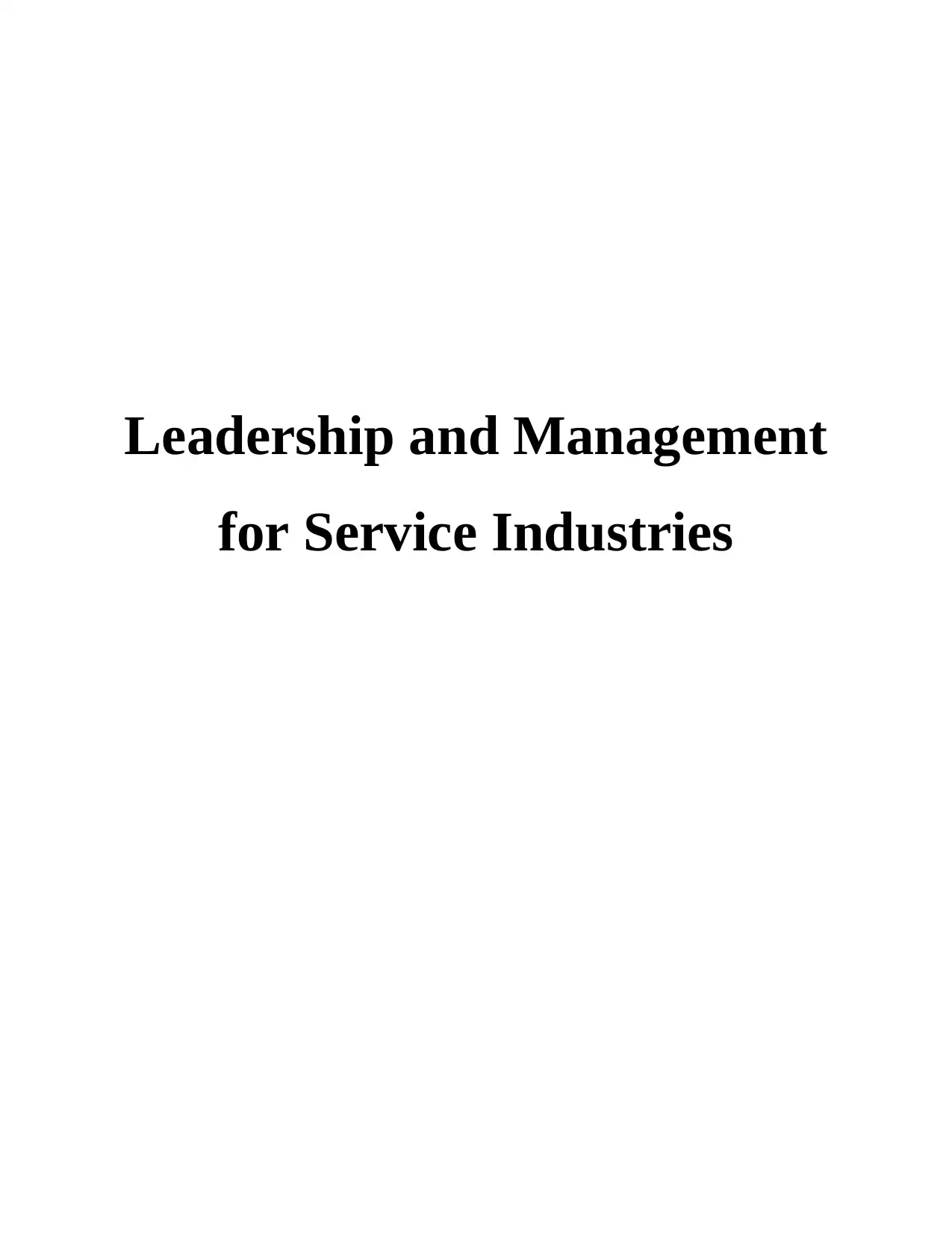
Leadership and Management
for Service Industries
for Service Industries
Paraphrase This Document
Need a fresh take? Get an instant paraphrase of this document with our AI Paraphraser
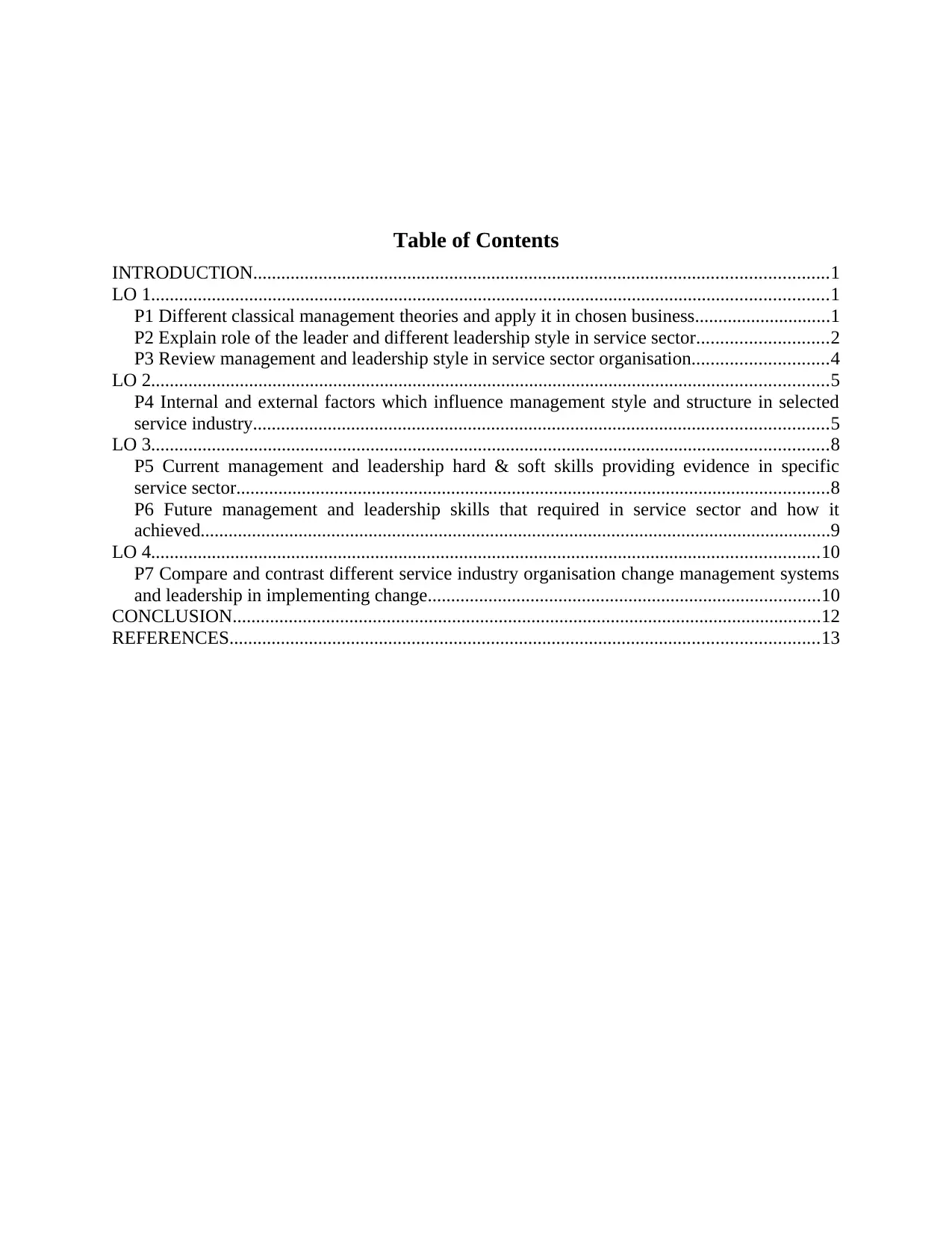
Table of Contents
INTRODUCTION...........................................................................................................................1
LO 1.................................................................................................................................................1
P1 Different classical management theories and apply it in chosen business.............................1
P2 Explain role of the leader and different leadership style in service sector............................2
P3 Review management and leadership style in service sector organisation.............................4
LO 2.................................................................................................................................................5
P4 Internal and external factors which influence management style and structure in selected
service industry...........................................................................................................................5
LO 3.................................................................................................................................................8
P5 Current management and leadership hard & soft skills providing evidence in specific
service sector...............................................................................................................................8
P6 Future management and leadership skills that required in service sector and how it
achieved.......................................................................................................................................9
LO 4...............................................................................................................................................10
P7 Compare and contrast different service industry organisation change management systems
and leadership in implementing change....................................................................................10
CONCLUSION..............................................................................................................................12
REFERENCES..............................................................................................................................13
INTRODUCTION...........................................................................................................................1
LO 1.................................................................................................................................................1
P1 Different classical management theories and apply it in chosen business.............................1
P2 Explain role of the leader and different leadership style in service sector............................2
P3 Review management and leadership style in service sector organisation.............................4
LO 2.................................................................................................................................................5
P4 Internal and external factors which influence management style and structure in selected
service industry...........................................................................................................................5
LO 3.................................................................................................................................................8
P5 Current management and leadership hard & soft skills providing evidence in specific
service sector...............................................................................................................................8
P6 Future management and leadership skills that required in service sector and how it
achieved.......................................................................................................................................9
LO 4...............................................................................................................................................10
P7 Compare and contrast different service industry organisation change management systems
and leadership in implementing change....................................................................................10
CONCLUSION..............................................................................................................................12
REFERENCES..............................................................................................................................13
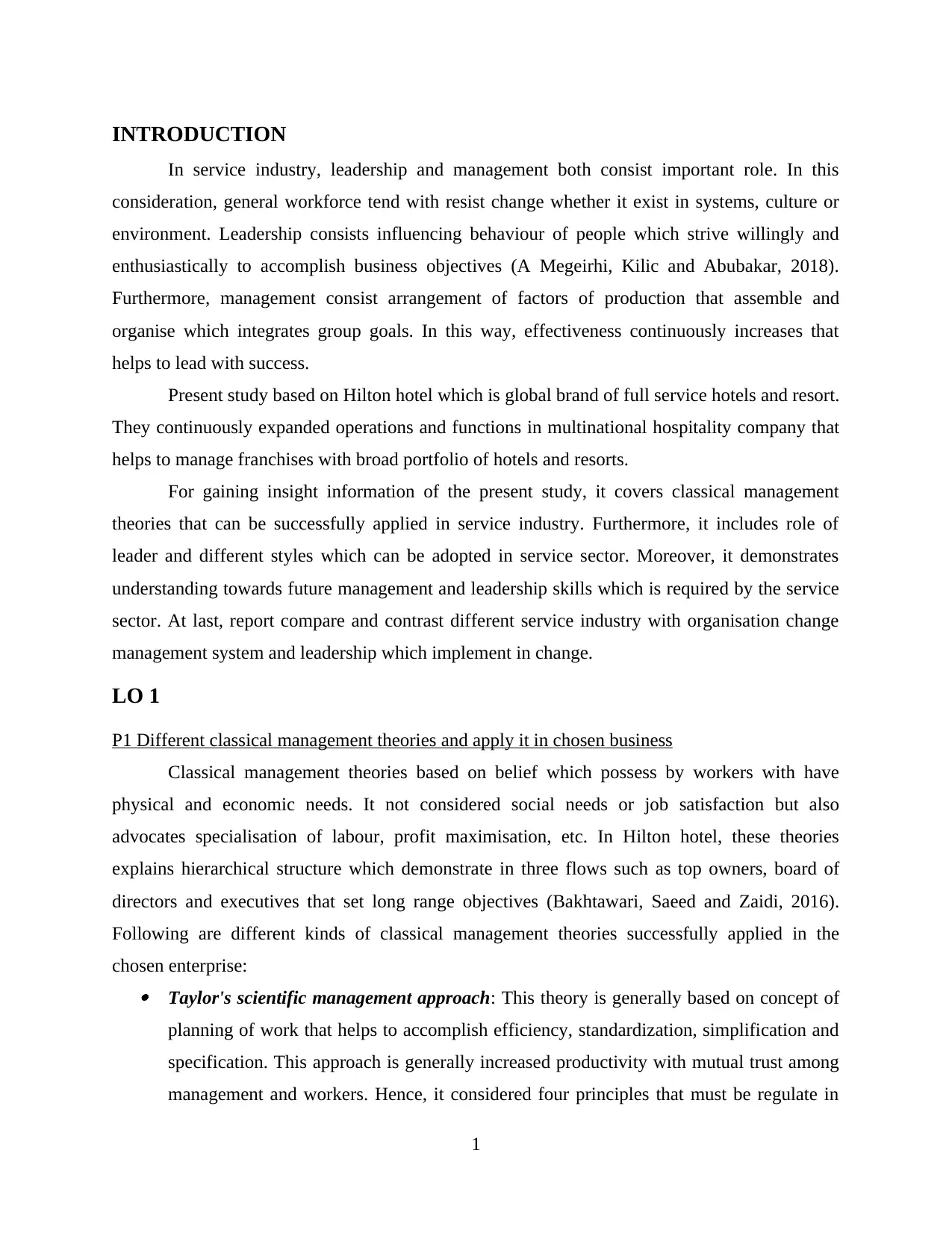
INTRODUCTION
In service industry, leadership and management both consist important role. In this
consideration, general workforce tend with resist change whether it exist in systems, culture or
environment. Leadership consists influencing behaviour of people which strive willingly and
enthusiastically to accomplish business objectives (A Megeirhi, Kilic and Abubakar, 2018).
Furthermore, management consist arrangement of factors of production that assemble and
organise which integrates group goals. In this way, effectiveness continuously increases that
helps to lead with success.
Present study based on Hilton hotel which is global brand of full service hotels and resort.
They continuously expanded operations and functions in multinational hospitality company that
helps to manage franchises with broad portfolio of hotels and resorts.
For gaining insight information of the present study, it covers classical management
theories that can be successfully applied in service industry. Furthermore, it includes role of
leader and different styles which can be adopted in service sector. Moreover, it demonstrates
understanding towards future management and leadership skills which is required by the service
sector. At last, report compare and contrast different service industry with organisation change
management system and leadership which implement in change.
LO 1
P1 Different classical management theories and apply it in chosen business
Classical management theories based on belief which possess by workers with have
physical and economic needs. It not considered social needs or job satisfaction but also
advocates specialisation of labour, profit maximisation, etc. In Hilton hotel, these theories
explains hierarchical structure which demonstrate in three flows such as top owners, board of
directors and executives that set long range objectives (Bakhtawari, Saeed and Zaidi, 2016).
Following are different kinds of classical management theories successfully applied in the
chosen enterprise: Taylor's scientific management approach: This theory is generally based on concept of
planning of work that helps to accomplish efficiency, standardization, simplification and
specification. This approach is generally increased productivity with mutual trust among
management and workers. Hence, it considered four principles that must be regulate in
1
In service industry, leadership and management both consist important role. In this
consideration, general workforce tend with resist change whether it exist in systems, culture or
environment. Leadership consists influencing behaviour of people which strive willingly and
enthusiastically to accomplish business objectives (A Megeirhi, Kilic and Abubakar, 2018).
Furthermore, management consist arrangement of factors of production that assemble and
organise which integrates group goals. In this way, effectiveness continuously increases that
helps to lead with success.
Present study based on Hilton hotel which is global brand of full service hotels and resort.
They continuously expanded operations and functions in multinational hospitality company that
helps to manage franchises with broad portfolio of hotels and resorts.
For gaining insight information of the present study, it covers classical management
theories that can be successfully applied in service industry. Furthermore, it includes role of
leader and different styles which can be adopted in service sector. Moreover, it demonstrates
understanding towards future management and leadership skills which is required by the service
sector. At last, report compare and contrast different service industry with organisation change
management system and leadership which implement in change.
LO 1
P1 Different classical management theories and apply it in chosen business
Classical management theories based on belief which possess by workers with have
physical and economic needs. It not considered social needs or job satisfaction but also
advocates specialisation of labour, profit maximisation, etc. In Hilton hotel, these theories
explains hierarchical structure which demonstrate in three flows such as top owners, board of
directors and executives that set long range objectives (Bakhtawari, Saeed and Zaidi, 2016).
Following are different kinds of classical management theories successfully applied in the
chosen enterprise: Taylor's scientific management approach: This theory is generally based on concept of
planning of work that helps to accomplish efficiency, standardization, simplification and
specification. This approach is generally increased productivity with mutual trust among
management and workers. Hence, it considered four principles that must be regulate in
1
⊘ This is a preview!⊘
Do you want full access?
Subscribe today to unlock all pages.

Trusted by 1+ million students worldwide
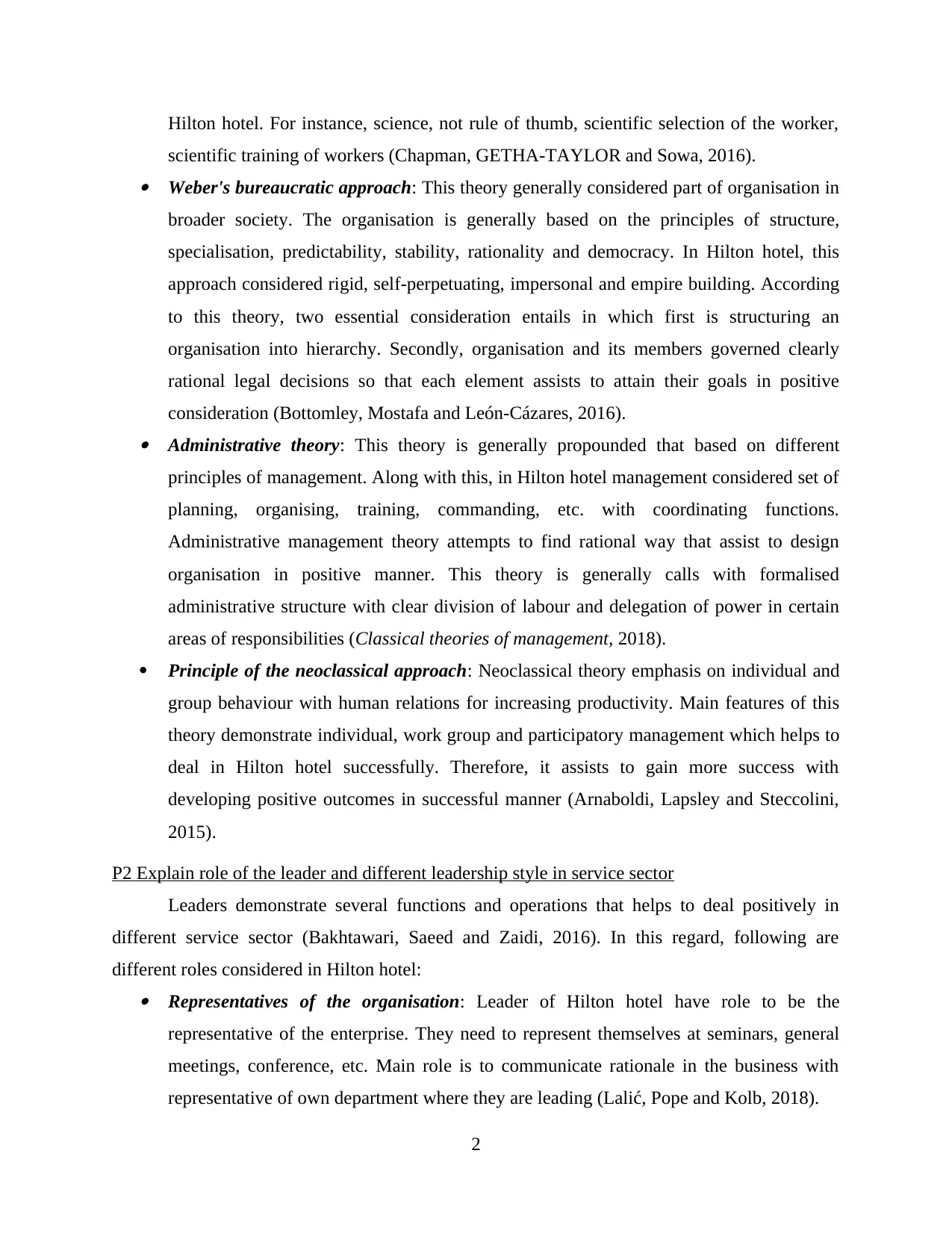
Hilton hotel. For instance, science, not rule of thumb, scientific selection of the worker,
scientific training of workers (Chapman, GETHA‐TAYLOR and Sowa, 2016). Weber's bureaucratic approach: This theory generally considered part of organisation in
broader society. The organisation is generally based on the principles of structure,
specialisation, predictability, stability, rationality and democracy. In Hilton hotel, this
approach considered rigid, self-perpetuating, impersonal and empire building. According
to this theory, two essential consideration entails in which first is structuring an
organisation into hierarchy. Secondly, organisation and its members governed clearly
rational legal decisions so that each element assists to attain their goals in positive
consideration (Bottomley, Mostafa and León‐Cázares, 2016). Administrative theory: This theory is generally propounded that based on different
principles of management. Along with this, in Hilton hotel management considered set of
planning, organising, training, commanding, etc. with coordinating functions.
Administrative management theory attempts to find rational way that assist to design
organisation in positive manner. This theory is generally calls with formalised
administrative structure with clear division of labour and delegation of power in certain
areas of responsibilities (Classical theories of management, 2018).
Principle of the neoclassical approach: Neoclassical theory emphasis on individual and
group behaviour with human relations for increasing productivity. Main features of this
theory demonstrate individual, work group and participatory management which helps to
deal in Hilton hotel successfully. Therefore, it assists to gain more success with
developing positive outcomes in successful manner (Arnaboldi, Lapsley and Steccolini,
2015).
P2 Explain role of the leader and different leadership style in service sector
Leaders demonstrate several functions and operations that helps to deal positively in
different service sector (Bakhtawari, Saeed and Zaidi, 2016). In this regard, following are
different roles considered in Hilton hotel: Representatives of the organisation: Leader of Hilton hotel have role to be the
representative of the enterprise. They need to represent themselves at seminars, general
meetings, conference, etc. Main role is to communicate rationale in the business with
representative of own department where they are leading (Lalić, Pope and Kolb, 2018).
2
scientific training of workers (Chapman, GETHA‐TAYLOR and Sowa, 2016). Weber's bureaucratic approach: This theory generally considered part of organisation in
broader society. The organisation is generally based on the principles of structure,
specialisation, predictability, stability, rationality and democracy. In Hilton hotel, this
approach considered rigid, self-perpetuating, impersonal and empire building. According
to this theory, two essential consideration entails in which first is structuring an
organisation into hierarchy. Secondly, organisation and its members governed clearly
rational legal decisions so that each element assists to attain their goals in positive
consideration (Bottomley, Mostafa and León‐Cázares, 2016). Administrative theory: This theory is generally propounded that based on different
principles of management. Along with this, in Hilton hotel management considered set of
planning, organising, training, commanding, etc. with coordinating functions.
Administrative management theory attempts to find rational way that assist to design
organisation in positive manner. This theory is generally calls with formalised
administrative structure with clear division of labour and delegation of power in certain
areas of responsibilities (Classical theories of management, 2018).
Principle of the neoclassical approach: Neoclassical theory emphasis on individual and
group behaviour with human relations for increasing productivity. Main features of this
theory demonstrate individual, work group and participatory management which helps to
deal in Hilton hotel successfully. Therefore, it assists to gain more success with
developing positive outcomes in successful manner (Arnaboldi, Lapsley and Steccolini,
2015).
P2 Explain role of the leader and different leadership style in service sector
Leaders demonstrate several functions and operations that helps to deal positively in
different service sector (Bakhtawari, Saeed and Zaidi, 2016). In this regard, following are
different roles considered in Hilton hotel: Representatives of the organisation: Leader of Hilton hotel have role to be the
representative of the enterprise. They need to represent themselves at seminars, general
meetings, conference, etc. Main role is to communicate rationale in the business with
representative of own department where they are leading (Lalić, Pope and Kolb, 2018).
2
Paraphrase This Document
Need a fresh take? Get an instant paraphrase of this document with our AI Paraphraser
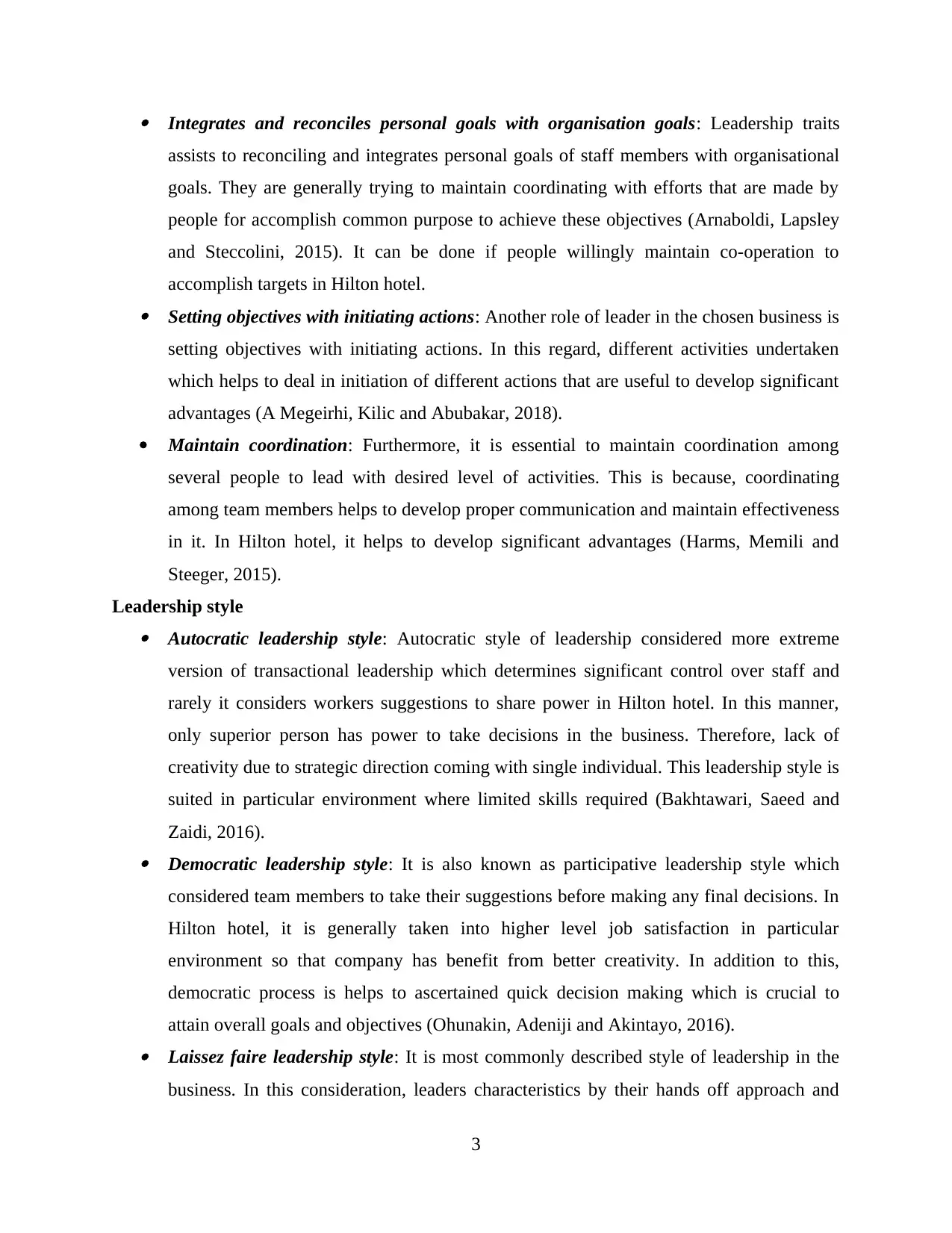
Integrates and reconciles personal goals with organisation goals: Leadership traits
assists to reconciling and integrates personal goals of staff members with organisational
goals. They are generally trying to maintain coordinating with efforts that are made by
people for accomplish common purpose to achieve these objectives (Arnaboldi, Lapsley
and Steccolini, 2015). It can be done if people willingly maintain co-operation to
accomplish targets in Hilton hotel. Setting objectives with initiating actions: Another role of leader in the chosen business is
setting objectives with initiating actions. In this regard, different activities undertaken
which helps to deal in initiation of different actions that are useful to develop significant
advantages (A Megeirhi, Kilic and Abubakar, 2018).
Maintain coordination: Furthermore, it is essential to maintain coordination among
several people to lead with desired level of activities. This is because, coordinating
among team members helps to develop proper communication and maintain effectiveness
in it. In Hilton hotel, it helps to develop significant advantages (Harms, Memili and
Steeger, 2015).
Leadership style Autocratic leadership style: Autocratic style of leadership considered more extreme
version of transactional leadership which determines significant control over staff and
rarely it considers workers suggestions to share power in Hilton hotel. In this manner,
only superior person has power to take decisions in the business. Therefore, lack of
creativity due to strategic direction coming with single individual. This leadership style is
suited in particular environment where limited skills required (Bakhtawari, Saeed and
Zaidi, 2016). Democratic leadership style: It is also known as participative leadership style which
considered team members to take their suggestions before making any final decisions. In
Hilton hotel, it is generally taken into higher level job satisfaction in particular
environment so that company has benefit from better creativity. In addition to this,
democratic process is helps to ascertained quick decision making which is crucial to
attain overall goals and objectives (Ohunakin, Adeniji and Akintayo, 2016). Laissez faire leadership style: It is most commonly described style of leadership in the
business. In this consideration, leaders characteristics by their hands off approach and
3
assists to reconciling and integrates personal goals of staff members with organisational
goals. They are generally trying to maintain coordinating with efforts that are made by
people for accomplish common purpose to achieve these objectives (Arnaboldi, Lapsley
and Steccolini, 2015). It can be done if people willingly maintain co-operation to
accomplish targets in Hilton hotel. Setting objectives with initiating actions: Another role of leader in the chosen business is
setting objectives with initiating actions. In this regard, different activities undertaken
which helps to deal in initiation of different actions that are useful to develop significant
advantages (A Megeirhi, Kilic and Abubakar, 2018).
Maintain coordination: Furthermore, it is essential to maintain coordination among
several people to lead with desired level of activities. This is because, coordinating
among team members helps to develop proper communication and maintain effectiveness
in it. In Hilton hotel, it helps to develop significant advantages (Harms, Memili and
Steeger, 2015).
Leadership style Autocratic leadership style: Autocratic style of leadership considered more extreme
version of transactional leadership which determines significant control over staff and
rarely it considers workers suggestions to share power in Hilton hotel. In this manner,
only superior person has power to take decisions in the business. Therefore, lack of
creativity due to strategic direction coming with single individual. This leadership style is
suited in particular environment where limited skills required (Bakhtawari, Saeed and
Zaidi, 2016). Democratic leadership style: It is also known as participative leadership style which
considered team members to take their suggestions before making any final decisions. In
Hilton hotel, it is generally taken into higher level job satisfaction in particular
environment so that company has benefit from better creativity. In addition to this,
democratic process is helps to ascertained quick decision making which is crucial to
attain overall goals and objectives (Ohunakin, Adeniji and Akintayo, 2016). Laissez faire leadership style: It is most commonly described style of leadership in the
business. In this consideration, leaders characteristics by their hands off approach and
3
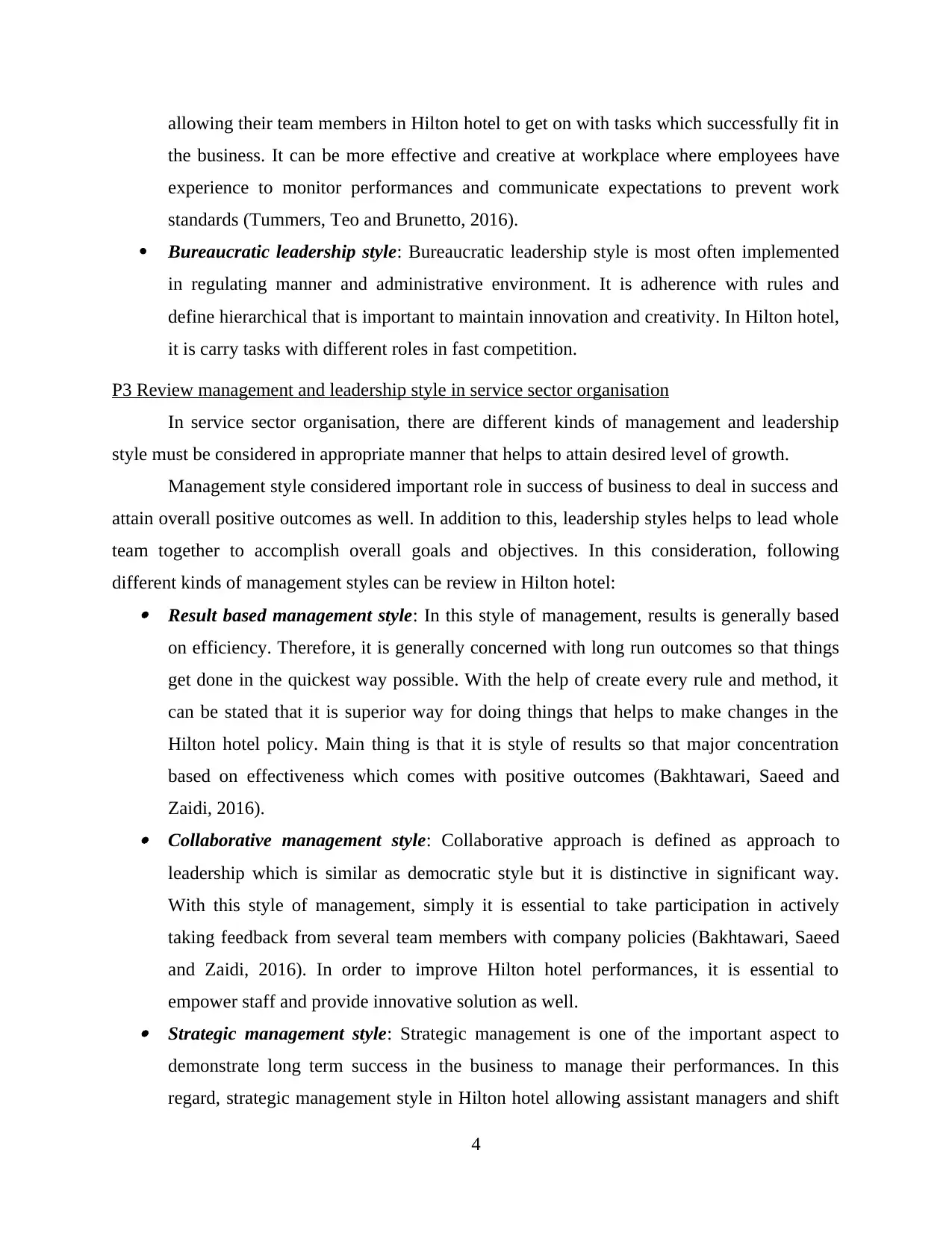
allowing their team members in Hilton hotel to get on with tasks which successfully fit in
the business. It can be more effective and creative at workplace where employees have
experience to monitor performances and communicate expectations to prevent work
standards (Tummers, Teo and Brunetto, 2016).
Bureaucratic leadership style: Bureaucratic leadership style is most often implemented
in regulating manner and administrative environment. It is adherence with rules and
define hierarchical that is important to maintain innovation and creativity. In Hilton hotel,
it is carry tasks with different roles in fast competition.
P3 Review management and leadership style in service sector organisation
In service sector organisation, there are different kinds of management and leadership
style must be considered in appropriate manner that helps to attain desired level of growth.
Management style considered important role in success of business to deal in success and
attain overall positive outcomes as well. In addition to this, leadership styles helps to lead whole
team together to accomplish overall goals and objectives. In this consideration, following
different kinds of management styles can be review in Hilton hotel: Result based management style: In this style of management, results is generally based
on efficiency. Therefore, it is generally concerned with long run outcomes so that things
get done in the quickest way possible. With the help of create every rule and method, it
can be stated that it is superior way for doing things that helps to make changes in the
Hilton hotel policy. Main thing is that it is style of results so that major concentration
based on effectiveness which comes with positive outcomes (Bakhtawari, Saeed and
Zaidi, 2016). Collaborative management style: Collaborative approach is defined as approach to
leadership which is similar as democratic style but it is distinctive in significant way.
With this style of management, simply it is essential to take participation in actively
taking feedback from several team members with company policies (Bakhtawari, Saeed
and Zaidi, 2016). In order to improve Hilton hotel performances, it is essential to
empower staff and provide innovative solution as well. Strategic management style: Strategic management is one of the important aspect to
demonstrate long term success in the business to manage their performances. In this
regard, strategic management style in Hilton hotel allowing assistant managers and shift
4
the business. It can be more effective and creative at workplace where employees have
experience to monitor performances and communicate expectations to prevent work
standards (Tummers, Teo and Brunetto, 2016).
Bureaucratic leadership style: Bureaucratic leadership style is most often implemented
in regulating manner and administrative environment. It is adherence with rules and
define hierarchical that is important to maintain innovation and creativity. In Hilton hotel,
it is carry tasks with different roles in fast competition.
P3 Review management and leadership style in service sector organisation
In service sector organisation, there are different kinds of management and leadership
style must be considered in appropriate manner that helps to attain desired level of growth.
Management style considered important role in success of business to deal in success and
attain overall positive outcomes as well. In addition to this, leadership styles helps to lead whole
team together to accomplish overall goals and objectives. In this consideration, following
different kinds of management styles can be review in Hilton hotel: Result based management style: In this style of management, results is generally based
on efficiency. Therefore, it is generally concerned with long run outcomes so that things
get done in the quickest way possible. With the help of create every rule and method, it
can be stated that it is superior way for doing things that helps to make changes in the
Hilton hotel policy. Main thing is that it is style of results so that major concentration
based on effectiveness which comes with positive outcomes (Bakhtawari, Saeed and
Zaidi, 2016). Collaborative management style: Collaborative approach is defined as approach to
leadership which is similar as democratic style but it is distinctive in significant way.
With this style of management, simply it is essential to take participation in actively
taking feedback from several team members with company policies (Bakhtawari, Saeed
and Zaidi, 2016). In order to improve Hilton hotel performances, it is essential to
empower staff and provide innovative solution as well. Strategic management style: Strategic management is one of the important aspect to
demonstrate long term success in the business to manage their performances. In this
regard, strategic management style in Hilton hotel allowing assistant managers and shift
4
⊘ This is a preview!⊘
Do you want full access?
Subscribe today to unlock all pages.

Trusted by 1+ million students worldwide
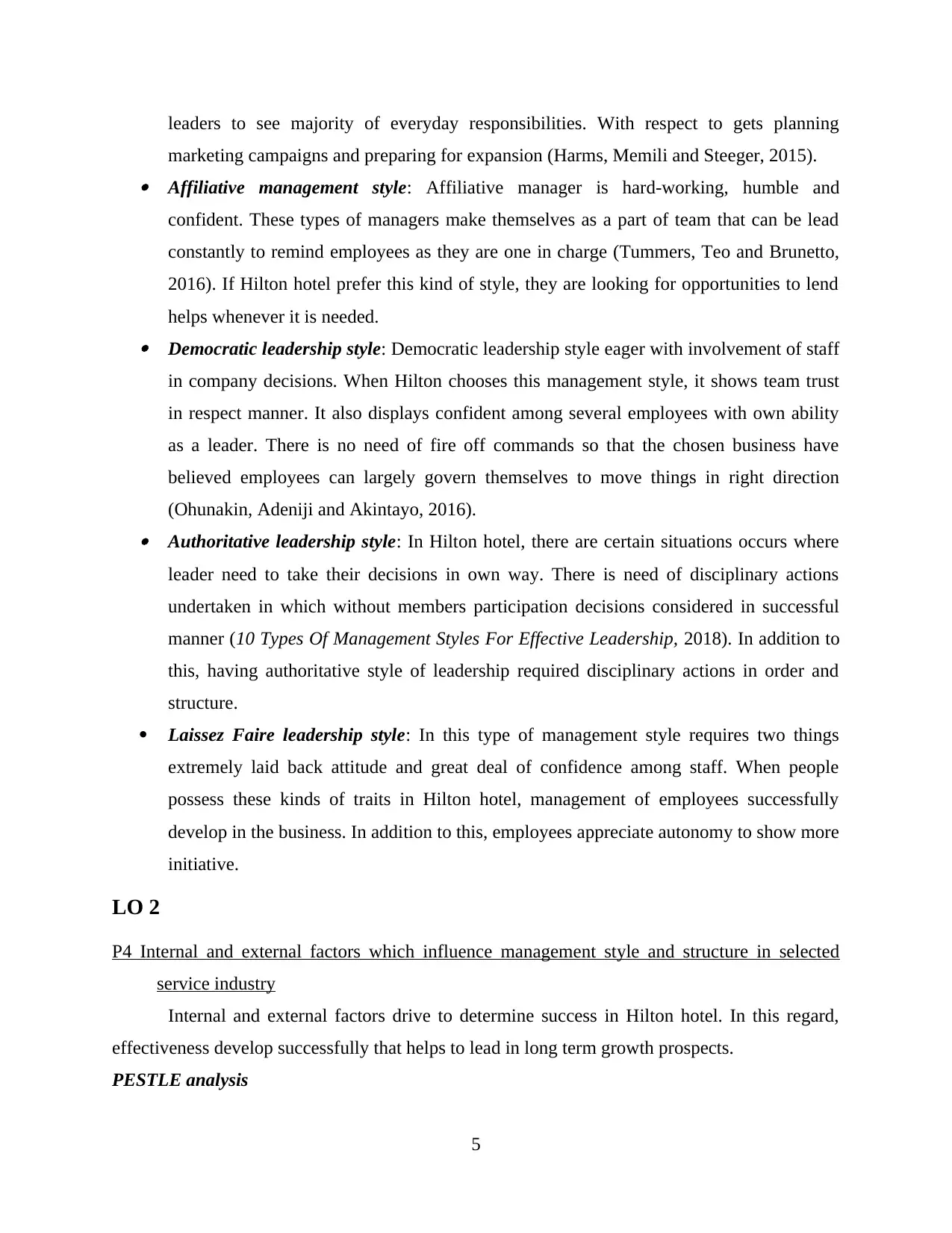
leaders to see majority of everyday responsibilities. With respect to gets planning
marketing campaigns and preparing for expansion (Harms, Memili and Steeger, 2015). Affiliative management style: Affiliative manager is hard-working, humble and
confident. These types of managers make themselves as a part of team that can be lead
constantly to remind employees as they are one in charge (Tummers, Teo and Brunetto,
2016). If Hilton hotel prefer this kind of style, they are looking for opportunities to lend
helps whenever it is needed. Democratic leadership style: Democratic leadership style eager with involvement of staff
in company decisions. When Hilton chooses this management style, it shows team trust
in respect manner. It also displays confident among several employees with own ability
as a leader. There is no need of fire off commands so that the chosen business have
believed employees can largely govern themselves to move things in right direction
(Ohunakin, Adeniji and Akintayo, 2016). Authoritative leadership style: In Hilton hotel, there are certain situations occurs where
leader need to take their decisions in own way. There is need of disciplinary actions
undertaken in which without members participation decisions considered in successful
manner (10 Types Of Management Styles For Effective Leadership, 2018). In addition to
this, having authoritative style of leadership required disciplinary actions in order and
structure.
Laissez Faire leadership style: In this type of management style requires two things
extremely laid back attitude and great deal of confidence among staff. When people
possess these kinds of traits in Hilton hotel, management of employees successfully
develop in the business. In addition to this, employees appreciate autonomy to show more
initiative.
LO 2
P4 Internal and external factors which influence management style and structure in selected
service industry
Internal and external factors drive to determine success in Hilton hotel. In this regard,
effectiveness develop successfully that helps to lead in long term growth prospects.
PESTLE analysis
5
marketing campaigns and preparing for expansion (Harms, Memili and Steeger, 2015). Affiliative management style: Affiliative manager is hard-working, humble and
confident. These types of managers make themselves as a part of team that can be lead
constantly to remind employees as they are one in charge (Tummers, Teo and Brunetto,
2016). If Hilton hotel prefer this kind of style, they are looking for opportunities to lend
helps whenever it is needed. Democratic leadership style: Democratic leadership style eager with involvement of staff
in company decisions. When Hilton chooses this management style, it shows team trust
in respect manner. It also displays confident among several employees with own ability
as a leader. There is no need of fire off commands so that the chosen business have
believed employees can largely govern themselves to move things in right direction
(Ohunakin, Adeniji and Akintayo, 2016). Authoritative leadership style: In Hilton hotel, there are certain situations occurs where
leader need to take their decisions in own way. There is need of disciplinary actions
undertaken in which without members participation decisions considered in successful
manner (10 Types Of Management Styles For Effective Leadership, 2018). In addition to
this, having authoritative style of leadership required disciplinary actions in order and
structure.
Laissez Faire leadership style: In this type of management style requires two things
extremely laid back attitude and great deal of confidence among staff. When people
possess these kinds of traits in Hilton hotel, management of employees successfully
develop in the business. In addition to this, employees appreciate autonomy to show more
initiative.
LO 2
P4 Internal and external factors which influence management style and structure in selected
service industry
Internal and external factors drive to determine success in Hilton hotel. In this regard,
effectiveness develop successfully that helps to lead in long term growth prospects.
PESTLE analysis
5
Paraphrase This Document
Need a fresh take? Get an instant paraphrase of this document with our AI Paraphraser
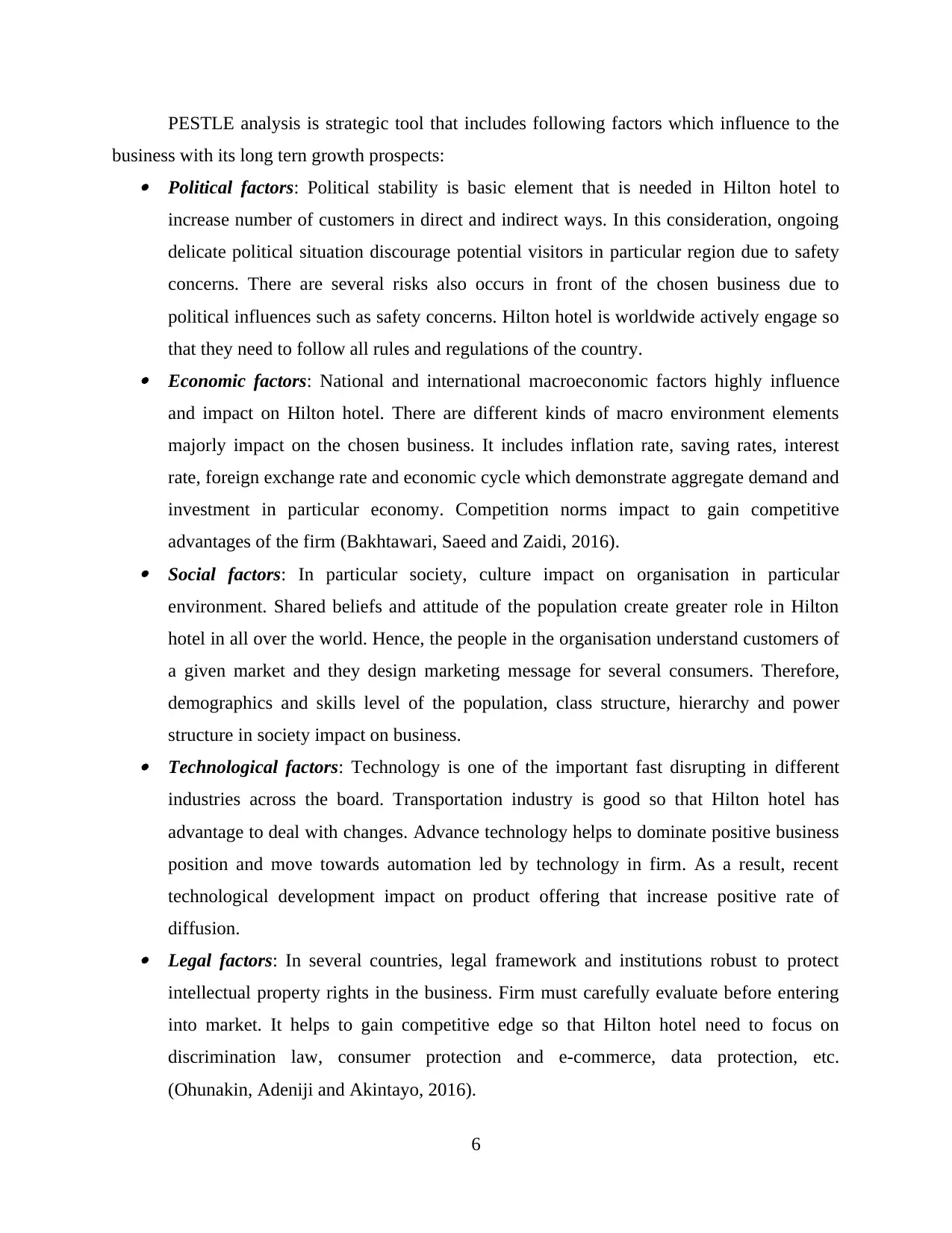
PESTLE analysis is strategic tool that includes following factors which influence to the
business with its long tern growth prospects: Political factors: Political stability is basic element that is needed in Hilton hotel to
increase number of customers in direct and indirect ways. In this consideration, ongoing
delicate political situation discourage potential visitors in particular region due to safety
concerns. There are several risks also occurs in front of the chosen business due to
political influences such as safety concerns. Hilton hotel is worldwide actively engage so
that they need to follow all rules and regulations of the country. Economic factors: National and international macroeconomic factors highly influence
and impact on Hilton hotel. There are different kinds of macro environment elements
majorly impact on the chosen business. It includes inflation rate, saving rates, interest
rate, foreign exchange rate and economic cycle which demonstrate aggregate demand and
investment in particular economy. Competition norms impact to gain competitive
advantages of the firm (Bakhtawari, Saeed and Zaidi, 2016). Social factors: In particular society, culture impact on organisation in particular
environment. Shared beliefs and attitude of the population create greater role in Hilton
hotel in all over the world. Hence, the people in the organisation understand customers of
a given market and they design marketing message for several consumers. Therefore,
demographics and skills level of the population, class structure, hierarchy and power
structure in society impact on business. Technological factors: Technology is one of the important fast disrupting in different
industries across the board. Transportation industry is good so that Hilton hotel has
advantage to deal with changes. Advance technology helps to dominate positive business
position and move towards automation led by technology in firm. As a result, recent
technological development impact on product offering that increase positive rate of
diffusion. Legal factors: In several countries, legal framework and institutions robust to protect
intellectual property rights in the business. Firm must carefully evaluate before entering
into market. It helps to gain competitive edge so that Hilton hotel need to focus on
discrimination law, consumer protection and e-commerce, data protection, etc.
(Ohunakin, Adeniji and Akintayo, 2016).
6
business with its long tern growth prospects: Political factors: Political stability is basic element that is needed in Hilton hotel to
increase number of customers in direct and indirect ways. In this consideration, ongoing
delicate political situation discourage potential visitors in particular region due to safety
concerns. There are several risks also occurs in front of the chosen business due to
political influences such as safety concerns. Hilton hotel is worldwide actively engage so
that they need to follow all rules and regulations of the country. Economic factors: National and international macroeconomic factors highly influence
and impact on Hilton hotel. There are different kinds of macro environment elements
majorly impact on the chosen business. It includes inflation rate, saving rates, interest
rate, foreign exchange rate and economic cycle which demonstrate aggregate demand and
investment in particular economy. Competition norms impact to gain competitive
advantages of the firm (Bakhtawari, Saeed and Zaidi, 2016). Social factors: In particular society, culture impact on organisation in particular
environment. Shared beliefs and attitude of the population create greater role in Hilton
hotel in all over the world. Hence, the people in the organisation understand customers of
a given market and they design marketing message for several consumers. Therefore,
demographics and skills level of the population, class structure, hierarchy and power
structure in society impact on business. Technological factors: Technology is one of the important fast disrupting in different
industries across the board. Transportation industry is good so that Hilton hotel has
advantage to deal with changes. Advance technology helps to dominate positive business
position and move towards automation led by technology in firm. As a result, recent
technological development impact on product offering that increase positive rate of
diffusion. Legal factors: In several countries, legal framework and institutions robust to protect
intellectual property rights in the business. Firm must carefully evaluate before entering
into market. It helps to gain competitive edge so that Hilton hotel need to focus on
discrimination law, consumer protection and e-commerce, data protection, etc.
(Ohunakin, Adeniji and Akintayo, 2016).
6
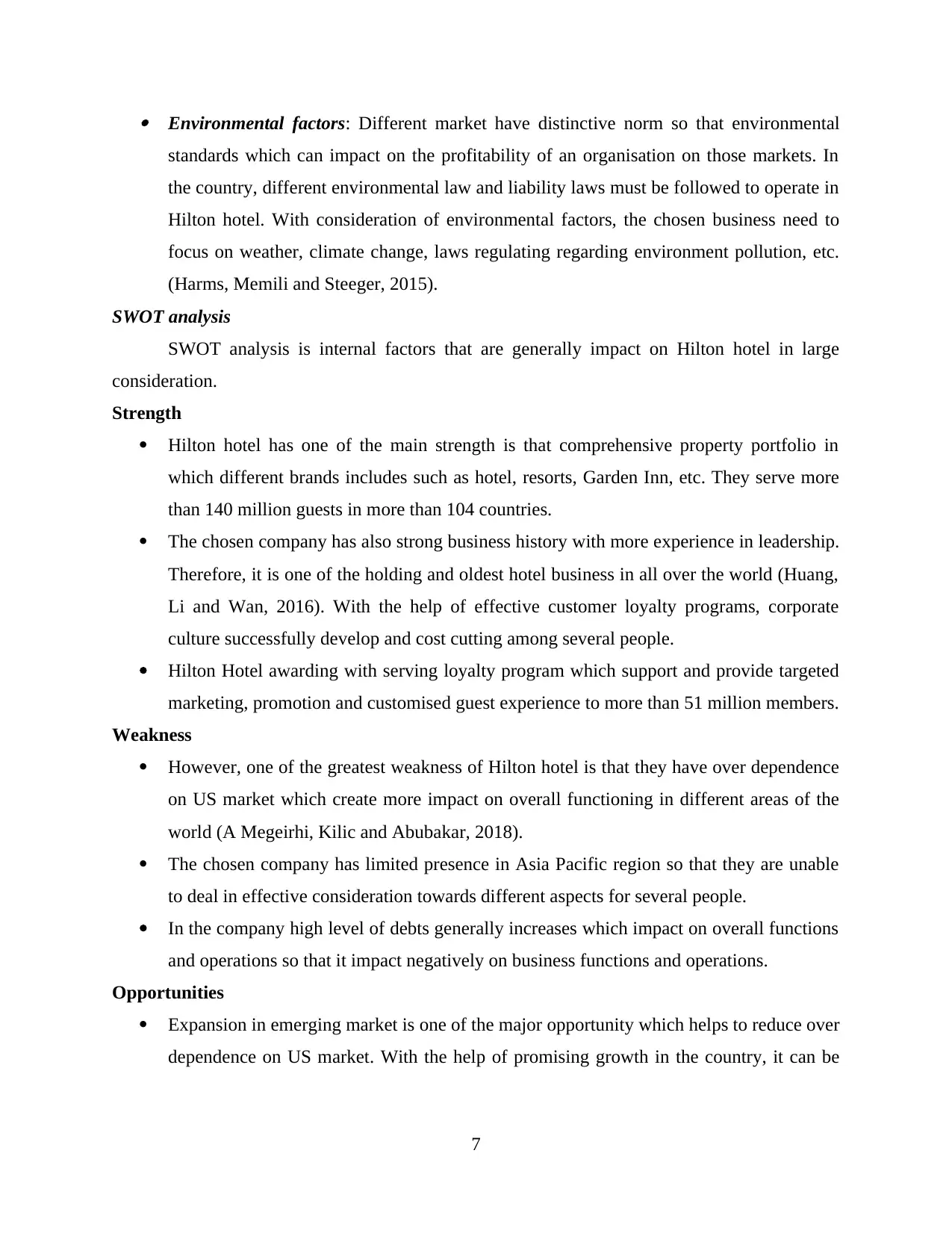
Environmental factors: Different market have distinctive norm so that environmental
standards which can impact on the profitability of an organisation on those markets. In
the country, different environmental law and liability laws must be followed to operate in
Hilton hotel. With consideration of environmental factors, the chosen business need to
focus on weather, climate change, laws regulating regarding environment pollution, etc.
(Harms, Memili and Steeger, 2015).
SWOT analysis
SWOT analysis is internal factors that are generally impact on Hilton hotel in large
consideration.
Strength
Hilton hotel has one of the main strength is that comprehensive property portfolio in
which different brands includes such as hotel, resorts, Garden Inn, etc. They serve more
than 140 million guests in more than 104 countries.
The chosen company has also strong business history with more experience in leadership.
Therefore, it is one of the holding and oldest hotel business in all over the world (Huang,
Li and Wan, 2016). With the help of effective customer loyalty programs, corporate
culture successfully develop and cost cutting among several people.
Hilton Hotel awarding with serving loyalty program which support and provide targeted
marketing, promotion and customised guest experience to more than 51 million members.
Weakness
However, one of the greatest weakness of Hilton hotel is that they have over dependence
on US market which create more impact on overall functioning in different areas of the
world (A Megeirhi, Kilic and Abubakar, 2018).
The chosen company has limited presence in Asia Pacific region so that they are unable
to deal in effective consideration towards different aspects for several people.
In the company high level of debts generally increases which impact on overall functions
and operations so that it impact negatively on business functions and operations.
Opportunities
Expansion in emerging market is one of the major opportunity which helps to reduce over
dependence on US market. With the help of promising growth in the country, it can be
7
standards which can impact on the profitability of an organisation on those markets. In
the country, different environmental law and liability laws must be followed to operate in
Hilton hotel. With consideration of environmental factors, the chosen business need to
focus on weather, climate change, laws regulating regarding environment pollution, etc.
(Harms, Memili and Steeger, 2015).
SWOT analysis
SWOT analysis is internal factors that are generally impact on Hilton hotel in large
consideration.
Strength
Hilton hotel has one of the main strength is that comprehensive property portfolio in
which different brands includes such as hotel, resorts, Garden Inn, etc. They serve more
than 140 million guests in more than 104 countries.
The chosen company has also strong business history with more experience in leadership.
Therefore, it is one of the holding and oldest hotel business in all over the world (Huang,
Li and Wan, 2016). With the help of effective customer loyalty programs, corporate
culture successfully develop and cost cutting among several people.
Hilton Hotel awarding with serving loyalty program which support and provide targeted
marketing, promotion and customised guest experience to more than 51 million members.
Weakness
However, one of the greatest weakness of Hilton hotel is that they have over dependence
on US market which create more impact on overall functioning in different areas of the
world (A Megeirhi, Kilic and Abubakar, 2018).
The chosen company has limited presence in Asia Pacific region so that they are unable
to deal in effective consideration towards different aspects for several people.
In the company high level of debts generally increases which impact on overall functions
and operations so that it impact negatively on business functions and operations.
Opportunities
Expansion in emerging market is one of the major opportunity which helps to reduce over
dependence on US market. With the help of promising growth in the country, it can be
7
⊘ This is a preview!⊘
Do you want full access?
Subscribe today to unlock all pages.

Trusted by 1+ million students worldwide
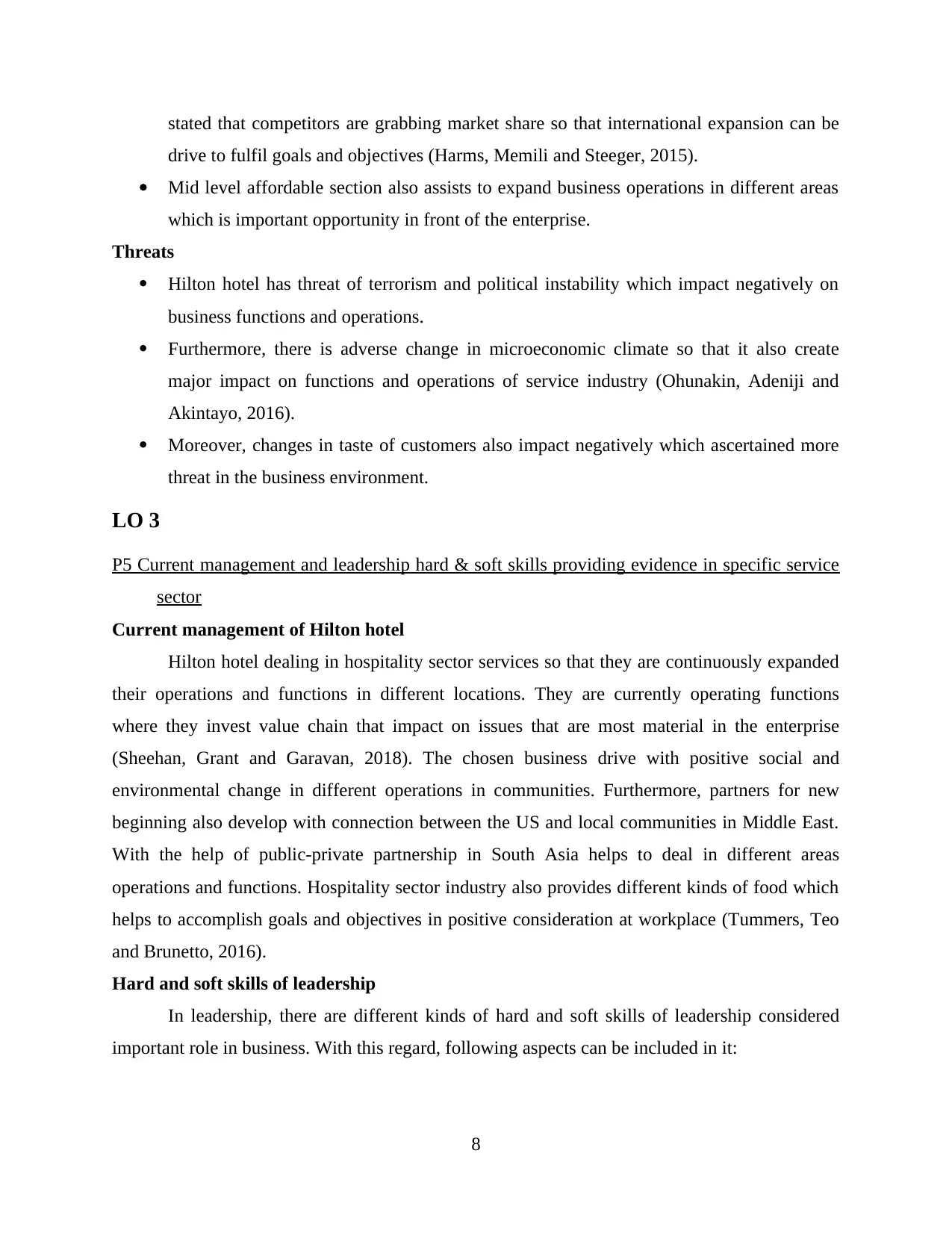
stated that competitors are grabbing market share so that international expansion can be
drive to fulfil goals and objectives (Harms, Memili and Steeger, 2015).
Mid level affordable section also assists to expand business operations in different areas
which is important opportunity in front of the enterprise.
Threats
Hilton hotel has threat of terrorism and political instability which impact negatively on
business functions and operations.
Furthermore, there is adverse change in microeconomic climate so that it also create
major impact on functions and operations of service industry (Ohunakin, Adeniji and
Akintayo, 2016).
Moreover, changes in taste of customers also impact negatively which ascertained more
threat in the business environment.
LO 3
P5 Current management and leadership hard & soft skills providing evidence in specific service
sector
Current management of Hilton hotel
Hilton hotel dealing in hospitality sector services so that they are continuously expanded
their operations and functions in different locations. They are currently operating functions
where they invest value chain that impact on issues that are most material in the enterprise
(Sheehan, Grant and Garavan, 2018). The chosen business drive with positive social and
environmental change in different operations in communities. Furthermore, partners for new
beginning also develop with connection between the US and local communities in Middle East.
With the help of public-private partnership in South Asia helps to deal in different areas
operations and functions. Hospitality sector industry also provides different kinds of food which
helps to accomplish goals and objectives in positive consideration at workplace (Tummers, Teo
and Brunetto, 2016).
Hard and soft skills of leadership
In leadership, there are different kinds of hard and soft skills of leadership considered
important role in business. With this regard, following aspects can be included in it:
8
drive to fulfil goals and objectives (Harms, Memili and Steeger, 2015).
Mid level affordable section also assists to expand business operations in different areas
which is important opportunity in front of the enterprise.
Threats
Hilton hotel has threat of terrorism and political instability which impact negatively on
business functions and operations.
Furthermore, there is adverse change in microeconomic climate so that it also create
major impact on functions and operations of service industry (Ohunakin, Adeniji and
Akintayo, 2016).
Moreover, changes in taste of customers also impact negatively which ascertained more
threat in the business environment.
LO 3
P5 Current management and leadership hard & soft skills providing evidence in specific service
sector
Current management of Hilton hotel
Hilton hotel dealing in hospitality sector services so that they are continuously expanded
their operations and functions in different locations. They are currently operating functions
where they invest value chain that impact on issues that are most material in the enterprise
(Sheehan, Grant and Garavan, 2018). The chosen business drive with positive social and
environmental change in different operations in communities. Furthermore, partners for new
beginning also develop with connection between the US and local communities in Middle East.
With the help of public-private partnership in South Asia helps to deal in different areas
operations and functions. Hospitality sector industry also provides different kinds of food which
helps to accomplish goals and objectives in positive consideration at workplace (Tummers, Teo
and Brunetto, 2016).
Hard and soft skills of leadership
In leadership, there are different kinds of hard and soft skills of leadership considered
important role in business. With this regard, following aspects can be included in it:
8
Paraphrase This Document
Need a fresh take? Get an instant paraphrase of this document with our AI Paraphraser
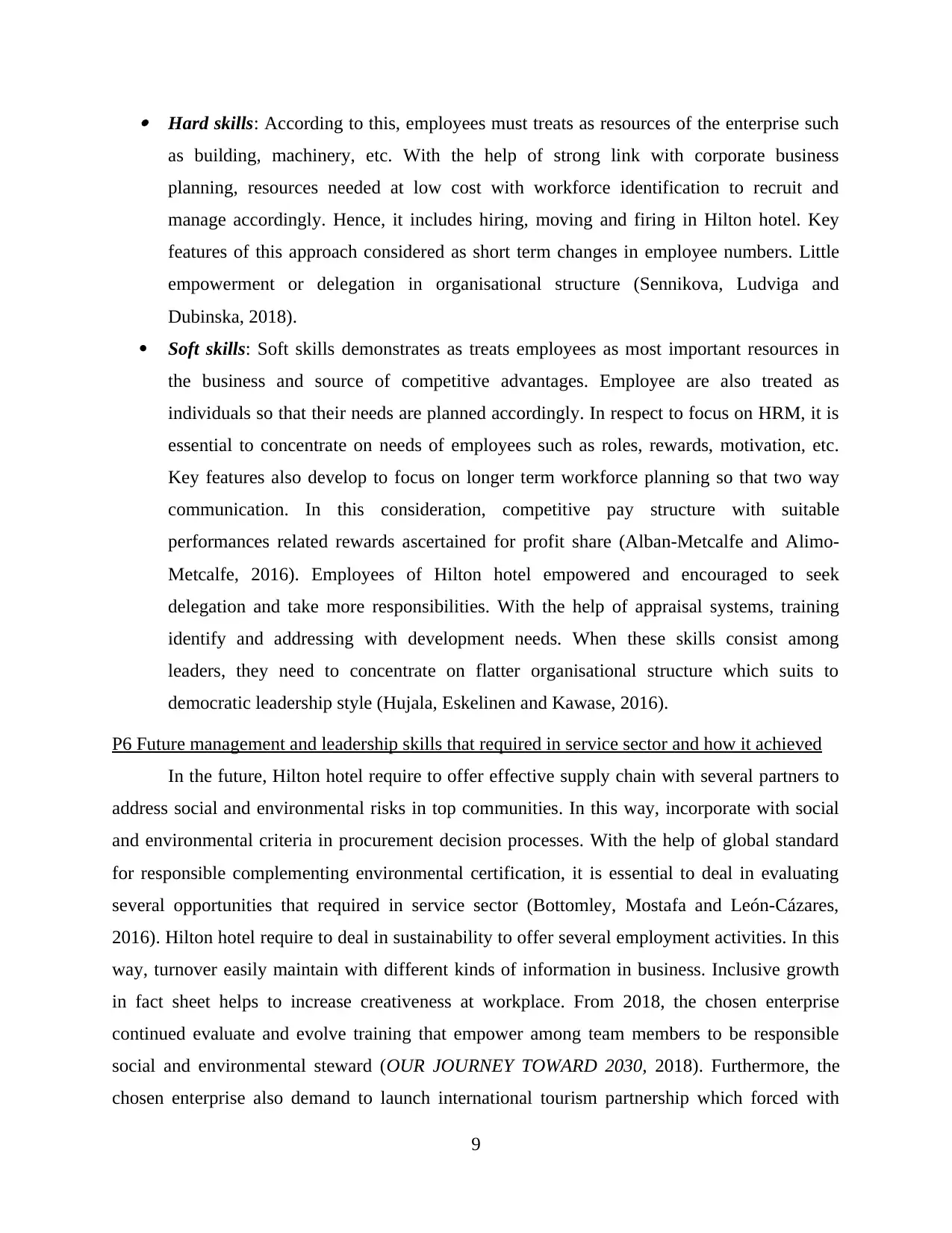
Hard skills: According to this, employees must treats as resources of the enterprise such
as building, machinery, etc. With the help of strong link with corporate business
planning, resources needed at low cost with workforce identification to recruit and
manage accordingly. Hence, it includes hiring, moving and firing in Hilton hotel. Key
features of this approach considered as short term changes in employee numbers. Little
empowerment or delegation in organisational structure (Sennikova, Ludviga and
Dubinska, 2018).
Soft skills: Soft skills demonstrates as treats employees as most important resources in
the business and source of competitive advantages. Employee are also treated as
individuals so that their needs are planned accordingly. In respect to focus on HRM, it is
essential to concentrate on needs of employees such as roles, rewards, motivation, etc.
Key features also develop to focus on longer term workforce planning so that two way
communication. In this consideration, competitive pay structure with suitable
performances related rewards ascertained for profit share (Alban-Metcalfe and Alimo-
Metcalfe, 2016). Employees of Hilton hotel empowered and encouraged to seek
delegation and take more responsibilities. With the help of appraisal systems, training
identify and addressing with development needs. When these skills consist among
leaders, they need to concentrate on flatter organisational structure which suits to
democratic leadership style (Hujala, Eskelinen and Kawase, 2016).
P6 Future management and leadership skills that required in service sector and how it achieved
In the future, Hilton hotel require to offer effective supply chain with several partners to
address social and environmental risks in top communities. In this way, incorporate with social
and environmental criteria in procurement decision processes. With the help of global standard
for responsible complementing environmental certification, it is essential to deal in evaluating
several opportunities that required in service sector (Bottomley, Mostafa and León‐Cázares,
2016). Hilton hotel require to deal in sustainability to offer several employment activities. In this
way, turnover easily maintain with different kinds of information in business. Inclusive growth
in fact sheet helps to increase creativeness at workplace. From 2018, the chosen enterprise
continued evaluate and evolve training that empower among team members to be responsible
social and environmental steward (OUR JOURNEY TOWARD 2030, 2018). Furthermore, the
chosen enterprise also demand to launch international tourism partnership which forced with
9
as building, machinery, etc. With the help of strong link with corporate business
planning, resources needed at low cost with workforce identification to recruit and
manage accordingly. Hence, it includes hiring, moving and firing in Hilton hotel. Key
features of this approach considered as short term changes in employee numbers. Little
empowerment or delegation in organisational structure (Sennikova, Ludviga and
Dubinska, 2018).
Soft skills: Soft skills demonstrates as treats employees as most important resources in
the business and source of competitive advantages. Employee are also treated as
individuals so that their needs are planned accordingly. In respect to focus on HRM, it is
essential to concentrate on needs of employees such as roles, rewards, motivation, etc.
Key features also develop to focus on longer term workforce planning so that two way
communication. In this consideration, competitive pay structure with suitable
performances related rewards ascertained for profit share (Alban-Metcalfe and Alimo-
Metcalfe, 2016). Employees of Hilton hotel empowered and encouraged to seek
delegation and take more responsibilities. With the help of appraisal systems, training
identify and addressing with development needs. When these skills consist among
leaders, they need to concentrate on flatter organisational structure which suits to
democratic leadership style (Hujala, Eskelinen and Kawase, 2016).
P6 Future management and leadership skills that required in service sector and how it achieved
In the future, Hilton hotel require to offer effective supply chain with several partners to
address social and environmental risks in top communities. In this way, incorporate with social
and environmental criteria in procurement decision processes. With the help of global standard
for responsible complementing environmental certification, it is essential to deal in evaluating
several opportunities that required in service sector (Bottomley, Mostafa and León‐Cázares,
2016). Hilton hotel require to deal in sustainability to offer several employment activities. In this
way, turnover easily maintain with different kinds of information in business. Inclusive growth
in fact sheet helps to increase creativeness at workplace. From 2018, the chosen enterprise
continued evaluate and evolve training that empower among team members to be responsible
social and environmental steward (OUR JOURNEY TOWARD 2030, 2018). Furthermore, the
chosen enterprise also demand to launch international tourism partnership which forced with
9
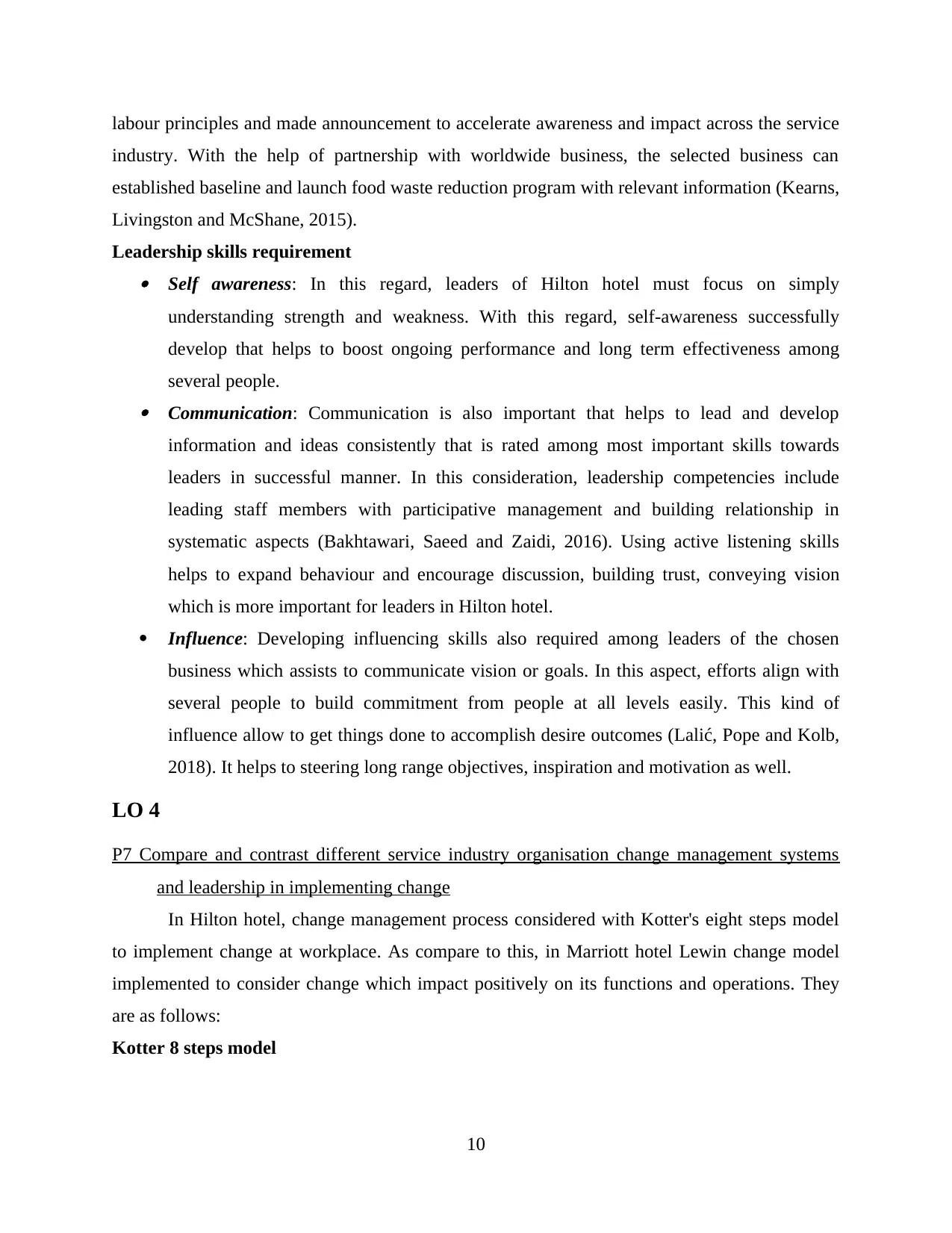
labour principles and made announcement to accelerate awareness and impact across the service
industry. With the help of partnership with worldwide business, the selected business can
established baseline and launch food waste reduction program with relevant information (Kearns,
Livingston and McShane, 2015).
Leadership skills requirement Self awareness: In this regard, leaders of Hilton hotel must focus on simply
understanding strength and weakness. With this regard, self-awareness successfully
develop that helps to boost ongoing performance and long term effectiveness among
several people. Communication: Communication is also important that helps to lead and develop
information and ideas consistently that is rated among most important skills towards
leaders in successful manner. In this consideration, leadership competencies include
leading staff members with participative management and building relationship in
systematic aspects (Bakhtawari, Saeed and Zaidi, 2016). Using active listening skills
helps to expand behaviour and encourage discussion, building trust, conveying vision
which is more important for leaders in Hilton hotel.
Influence: Developing influencing skills also required among leaders of the chosen
business which assists to communicate vision or goals. In this aspect, efforts align with
several people to build commitment from people at all levels easily. This kind of
influence allow to get things done to accomplish desire outcomes (Lalić, Pope and Kolb,
2018). It helps to steering long range objectives, inspiration and motivation as well.
LO 4
P7 Compare and contrast different service industry organisation change management systems
and leadership in implementing change
In Hilton hotel, change management process considered with Kotter's eight steps model
to implement change at workplace. As compare to this, in Marriott hotel Lewin change model
implemented to consider change which impact positively on its functions and operations. They
are as follows:
Kotter 8 steps model
10
industry. With the help of partnership with worldwide business, the selected business can
established baseline and launch food waste reduction program with relevant information (Kearns,
Livingston and McShane, 2015).
Leadership skills requirement Self awareness: In this regard, leaders of Hilton hotel must focus on simply
understanding strength and weakness. With this regard, self-awareness successfully
develop that helps to boost ongoing performance and long term effectiveness among
several people. Communication: Communication is also important that helps to lead and develop
information and ideas consistently that is rated among most important skills towards
leaders in successful manner. In this consideration, leadership competencies include
leading staff members with participative management and building relationship in
systematic aspects (Bakhtawari, Saeed and Zaidi, 2016). Using active listening skills
helps to expand behaviour and encourage discussion, building trust, conveying vision
which is more important for leaders in Hilton hotel.
Influence: Developing influencing skills also required among leaders of the chosen
business which assists to communicate vision or goals. In this aspect, efforts align with
several people to build commitment from people at all levels easily. This kind of
influence allow to get things done to accomplish desire outcomes (Lalić, Pope and Kolb,
2018). It helps to steering long range objectives, inspiration and motivation as well.
LO 4
P7 Compare and contrast different service industry organisation change management systems
and leadership in implementing change
In Hilton hotel, change management process considered with Kotter's eight steps model
to implement change at workplace. As compare to this, in Marriott hotel Lewin change model
implemented to consider change which impact positively on its functions and operations. They
are as follows:
Kotter 8 steps model
10
⊘ This is a preview!⊘
Do you want full access?
Subscribe today to unlock all pages.

Trusted by 1+ million students worldwide
1 out of 16
Related Documents
Your All-in-One AI-Powered Toolkit for Academic Success.
+13062052269
info@desklib.com
Available 24*7 on WhatsApp / Email
![[object Object]](/_next/static/media/star-bottom.7253800d.svg)
Unlock your academic potential
Copyright © 2020–2026 A2Z Services. All Rights Reserved. Developed and managed by ZUCOL.





